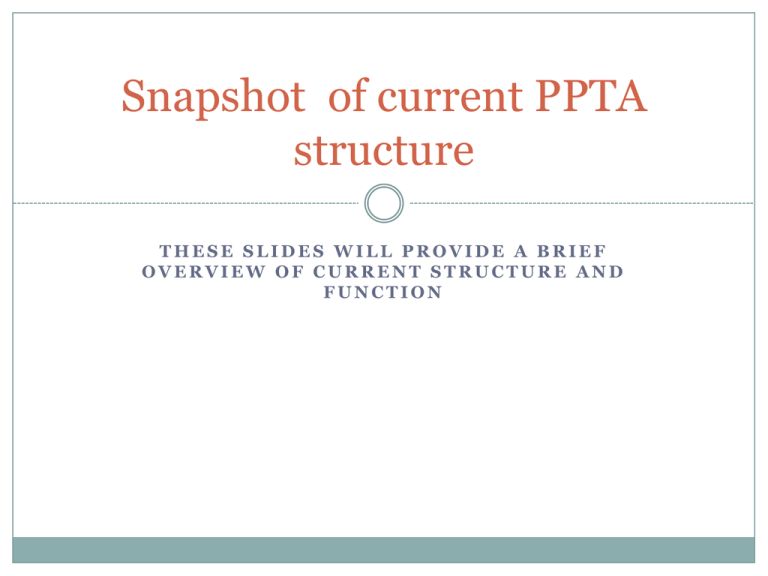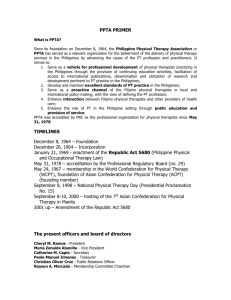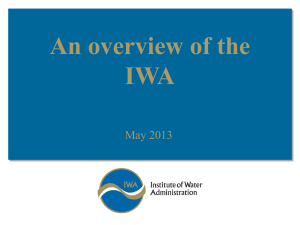Snapshot of current PPTA structure
advertisement

Snapshot of current PPTA structure THESE SLIDES WILL PROVIDE A BRIEF OVERVIEW OF CURRENT STRUCTURE AND FUNCTION President , President Elect, Vice President, Treasurer, Secretary, Chief Delegate, Member-at-Large Directors Northcentral District, Northeast District, Northwest District, Southcentral District , Southeast District, Southwest District, Westcentral District House of Delegates (H0D) Chapter office staff Committees and Special Interest Groups (SIG) Ethics, Insurance Relations, Legislative, Membership, Nominating, Practice, Public Relations, Referral for Profit, Research, Acute care, Geriatric, Neurologic, Pediatric, PTA, Private Practice Positive Action Committee (PAC) Reimbursement specialist How Your Chapter Works Each chapter is governed by an elected board of directors, all of whom are available to discuss issues affecting the Association and the physical therapy profession. The chapter president is responsible for governing and directing all chapter activities. The chief delegate participates in the House of Delegates, which is the highest decision-making body of the Association, and makes decisions on issues that frequently have far-reaching implications for the Association and the profession. Executive Committee Consists of officers elected by general membership including: President President Elect Vice President Treasurer Secretary Chief Delegate District Director Member-at-Large (elected from district directors annually) Directors Consists of elected chair of each district: Northcentral District Northeast District Northwest District Southcentral District Southeast District Southwest District Westcentral District Required Committees Ethics Committee is responsible for fostering ethical practice in physical therapy as defined in APTA’s Code of Ethics and deals with issues that arise at the Chapter level Finance Committee advises the Board of Directors on matters pertaining to the Chapter’s financial needs, growth, and stability based on periodic review of income, expenditures, and investments and presents an annual budget to the BoD Nominating Committee Chairperson is elected by the general membership to facilitate chapter elections and to assist the District Nominating Committee chairs (elected by district members) with district elections; also assist with PTA Caucus and SIG elections Other Chapter Committees – with a member appointed in each district Insurance Relations Legislative Membership Practice Public Relations Referral for Profit Research House of Delegates The House of Delegates, held annually each spring, is the highest policy-making body of the association. It is comprised of chapter voting delegates and section, assembly, and PTA Caucus non-voting delegates, and consultants. In PA, each district elects representative delegates for a 2 year term to the APTA House of Delegates. Special Interest Group (SIG) The purpose of the Physical Therapy Special Interest Group (SIG) is to provide a means by which physical therapists and physical therapist assistants may meet, exchange information/ideas, identify issues, provide a means by which members having a common interest in a special area of physical therapy my confer, and serve as a clinical resource for all PPTA members and the SIG itself. In addition, they respond to areas of concern related to PT SIG members, advocate and advance the needs of SIG members, consumers, and members of the Chapter relative to the SIG’s area of interest. Membership in the PPTA SIG is FREE and open to all active and affiliate members in good standing within the PPTA. Meetings of the SIG are held in conjunction with the PPTA Fall Meetings. Dates and times are published in the PPTA Newsletters. PA SIGs Acute Care Geriatric Neurologic Pediatric Physical Therapist Assistant Private Practice Political Action Committee Political Action Committees (PAC's) allow individuals with shared legislative interests to pool their resources for a strong, unified voice in the legislature. Contributions to the PA PT PAC are used to support state candidates in Harrisburg who advocate for physical therapists and our patients. PACs are only able to accept donations from individuals; businesses and organizations, including the PPTA, are not allowed to donate to PACs. This means that our ability to support legislators is entirely dependent on the donations we receive from you and other physical therapists in Pennsylvania. PAC donations are not tax deductible. Legislative Issues Fund Fund created to support ongoing legislative issues in the Chapter separate and distinct from the PAC Monies raised will support issues and not candidates and is not federally regulated -recent examples include support for legislative training day and visits in Harrisburg, financial assistance for Highmark issues related to payment limitations, funding to support fairness in copayment Coordinated by BoD of PPTA and work very closely with lobbying and legal efforts and legislative committee











